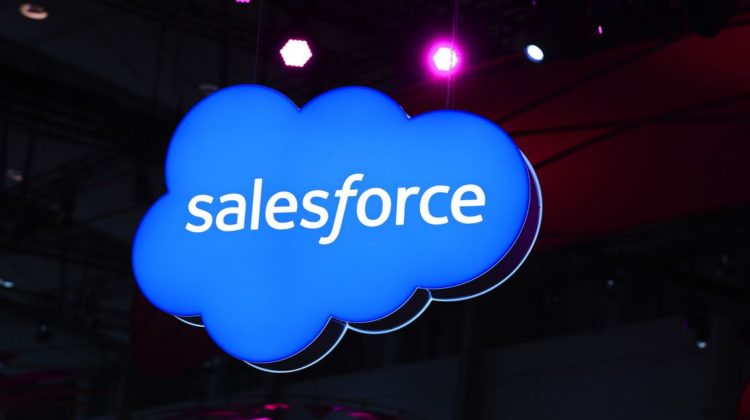
Text size
A Salesforce.Com Inc. logo
Krisztian Bocsi/Bloomberg
Salesforce.com
shares were trading lower Wednesday amid investor concerns over the premium price the company agreed to pay for the collaboration software company
Slack Technologies
, as well as some modest disappointment about the company’s financial performance and the announcement that longtime CFO Mark Hawkins was retiring.
Analysts worry that in CEO Marc Benioff’s enthusiasm to expand his suite of cloud-based services to include Slack, Salesforce may be overpaying by a considerable margin for a money-losing business facing fierce competition from
Microsoft
Teams—and which has yet to reach a $1 billion revenue run rate.
To review: Salesforce on Tuesday announced that it had agreed to pay $27.7 billion for Slack in a stock-and-cash deal. Each Slack (WORK) share will be exchanged for $26.79 in cash plus 0.0776 Salesforce (CRM) shares, which was originally worth $45.54 a share in total, but is down to $44 with today’s decline in the price of Salesforce shares.
Salesforce also reported better-than-expected results for its fiscal third quarter ended Oct. 31. The company posted revenue of $5.42 billion, up 20% year-over-year, with non-GAAP profits of $1.74 a share, ahead of the Wall Street consensus at $5.25 billion and 75 cents a share.
The latest quarter results include a gain of 86 cents a share to reflect gains on the company’s strategic investments. But the Street had some nits to pick on other items in the announcement
For the fiscal first quarter ending in January, Salesforce sees revenue of $5.68 billion to $5.715 billion, above the Street consensus at $5.25 billion. The company now sees revenue for the January 2021 fiscal year of $21.10 billion to $21.11 billion, above the Street at $20.8 billion. For the January 2022 fiscal year, Salesforce sees revenue of $25.45 billion to $25.55 billion, up about 21%, and including about $600 million related to the Slack acquisition.
Citigroup analyst Walter Pritchard on Wednesday cut his rating on Salesforce shares to Neutral from Buy, trimming his price target to $250, from $300.
“We aren’t fans of [the] Slack deal,” he wrote bluntly in a research note. “We don’t think Salesforce needed to buy this asset, especially with already high customer overlap and the landscape in this space where Microsoft (MSFT) Teams is becoming ubiquitous. The multiple paid makes it challenging to see a positive return and the history of large M&A at Salesforce leaves us concerned there is little near-term upside to shares as questions of challenged organic growth will likely surface.”
Pritchard says that while the deal was “well telegraphed,” the price was higher than he expected.
“We have previously had a mixed view of Slack, with the product seeing great adoption amongst ‘tech forward’ customers,” he wrote. “This is evident in the disclosed 94% overlap between Slack and Salesforce customers. The challenge we see is getting Slack into the mainstream customers where Microsoft Teams has a strong presence by virtue of existing Microsoft relationships with these customers.” He thinks the $27.7 billion price tag will make it challenging for Salesforce to generate a positive return from the acquisition.
Macquarie Research analyst Frederick Havenmeyer keeps his Outperform rating on Salesforce shares, but professes concerns about the deal. “The company offered a vision for Salesforce plus Slack as the new ‘operating system’ for work, with Slack acting as the integrating front-end interface for all Salesforce clouds and third party apps,” he said in a research note. “While Salesforce has been consistently ambitious with a track record of successful M&A, we question whether this deal at this valuation for a decelerating and ~7% dilutive asset is the right outcome of a build versus buy versus partner debate.”
Needham analyst Scott Berg repeats his Hold rating on Salesforce. He says the latest quarter growth in a closely watched measure of future results called cRPO—“current remaining performance obligations”—came in weaker than expected. He also thinks the Slack deal signals a shift by Salesforce to a growth-by-acquisition approach, and that larger and more expensive deals could follow.
“This strategy reflects the strategies employed by
Oracle
and
SAP,
which both lack drivers for sustained, long-term sales synergies,” Berg wrote. “Additionally, large acquisitions bring challenges with operating margin and free cash flow margin dilution. Given how Oracle and SAP shares have underperformed the last several years, we believe this new strategy will lead to further Salesforce underperformance.”
UBS analyst Karl Keirstead keeps his Buy rating, but cuts his target price to $300, from $325—and in general he is not a happy camper. “We’re maintaining our Buy on Salesforce shares given solid checks on post-Covid software demand, but we believe the near-term is now muddied by a modest cRPO miss, a Slack acquisition price of $28 billion that seems rich and a synergy story that isn’t convincing, the departure of the CFO and the likelihood that the long-term organic growth target of 20% needs to be trimmed by a couple points,” he wrote.
Piper Sandler analyst Brent Bracelin keeps his Overweight rating on Salesforce shares, and says that the Slack deal has “game-changer potential,” but adds that it comes with “sticker shock.”
Bracelin notes that Slack was still in the early stages of expanding its enterprise sales teams, “and should benefit from Salesforce’s broader sales distribution and existing enterprise relationships.” But he notes that some investors are pushing back on the valuation—the purchase price comes at more than 24 times expected calendar 2021 sales and requires the issuance of about 50 million more shares—for a company that has yet to reach a $1 billion run rate.
In trading Wednesday, Salesforce shares were off 7%, to $224.49, while Slack was off 1.5% to $43.17.
Write to Eric J. Savitz at eric.savitz@barrons.com
